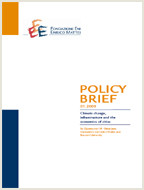Cancún: don’t look back in anger
This policy brief will analyze expectations and challenges behind the 16th Conference of the Parties (COP 16) in Cancún, Mexico (29 November – 10 December 2010). In particular, the policy brief will focus on hot issues and key countries, the need for a “rescue plan” for the second Kyoto Protocol commitment period in the event of a Cancún failure and, finally, on a possible post-2012 climate policy architecture. The starting point will be the Copenhagen Accord, where a huge contradiction emerged between the promises formulated (the 2°C goal) and the determination to fulfil them (voluntary national policy actions). A compromise among different interests and requests of countries is still missing and, while EU climate leadership is starting to be questioned, a credible signal still has to be given by the highest emitters. However, what presumably will emerge in Cancún is a governance problem and parties will have to address the meeting as an opportunity to pave the way toward the establishment of an effective international climate change governance system. According to the above-described issues, this policy brief aims at proposing a three-point agenda for guiding policy makers to a credible and ambitious position for the future negotiations in Cancún.

